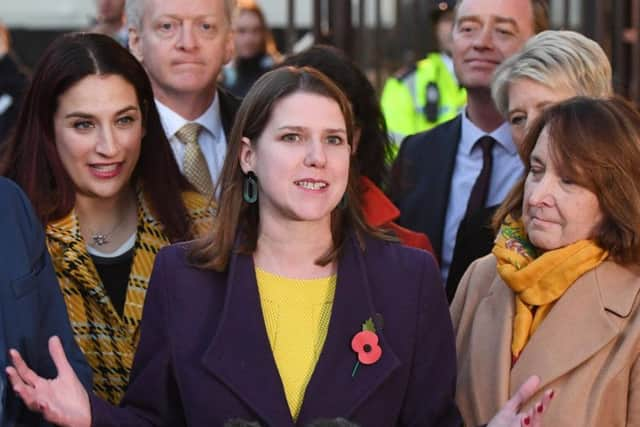Here's how pacts and deals could change the outcome of the General Election
Yet the wooing that has been going on between political parties over whether they will, or won’t, stand in certain seats at this general election, has been unparalleled, and will soon require a definitive decision.
One of the results of the division across the UK and within the political system over Brexit, is parties are now openly discussing not fighting seats. Tactical standing appears to be taking the place of tactical voting - or perhaps forcing the electorate’s hand in the matter.
Advertisement
Hide AdAdvertisement
Hide AdPolling has suggested that if 30 per cent of Remain voters cast their votes tactically in the general election, then a coalition of Labour, Lib Dem, SNP and other smaller parties could win a slim majority and defeat Boris Johnson.


The thinking is why have two pro-Remain candidates on the ballot when it could actually ensure that neither win?
On the other side of the debate, the Brexit Party has been hoping the Tories pick up the phone to thrash out a similar scenario for pro-Leave voters.
But just who is signing up to this, could it work and is it actually rather undemocratic?
Who’s zooming who?
Jo Swinson’s party, the Liberal Democrats are pushing the idea of pro-Remain parties standing aside for each other, where one or the other is more likely to win a seat. Mostly because it believes it’s the party who would scoop up most seats in this way.
With the agreement of the Greens and Plaid Cymru such a pact was put into play at the Brecon and Radnorshire by-election in the summer, with the Lib Dems standing a candidate, Jane Dodds, who went on to beat the Conservative incumbent, Chris Davies.
Already the Lib Dems have reportedly agreed to stand aside for the Greens in the Isle of Wight and Brighton Pavilion, could step aside in Broxtowe, to help Anna Soubry, the Independent Group for Change leader and do the same for former Tory MP Dominic Grieve in Beaconsfield who is standing as an independent.
Plaid Cymru has said its still internally discussing how an alliance with the others might work.
Advertisement
Hide AdAdvertisement
Hide AdMeanwhile in Northern Ireland Sinn Fein has said it will not stand in three seats to ensure a pro-Remain candidate wins. In South Belfast it will back the SDLP, in East Belfast it supports the Alliance candidate and an independent in North Down.
What about Labour and the Conservatives?
Jeremy Corbyn has ruled out any deals or pacts with any other party - which is unsurprising given Jo Swinson has point blank refused supporting any potential Labour government if he is at the helm. But he has made overtures towards the SNP regarding a Corbyn government granting a section 30 order for a second independence referendum.
However it would take a lot more than that to convince the SNP not to stand candidates in seats held by Scottish Labour or where it came a close second in 2017. The SNP is determined to try and replicate its landslide result from the 2015 election where it scooped up 56 of the 59 Scottish seats.
Which is why it’s a bit upset that its pro-independence allies, the Scottish Greens, have said they will stand candidates against them, even in marginals like Perth and North Perthshire. The Scottish Greens know they’re unlikely to win that seat, but they want to make a point about the SNP incumbent’s support for the oil and gas industry in a time of climate emergency. That point could result in a Tory gain.
Which is one of many the Conservatives believe they could pick up, especially from Labour in the north of England, despite Nigel Farage believing his Brexit Party can do exactly the same.
Boris Johnson is adamant he will not enter into a pact with the Brexit Party, so Farage - who has declined to stand for election - has said his party will field 600 candidates across the UK, leading to concerns among Brexiteers that the pro-Leave support will be split.
And over in Northern Ireland, the pro-Leave parties have also failed to reach any agreement on pacts. The Ulster Unionist Party (UUP) has announced it will stand in all 18 constituencies, despite the fact that unionist parties traditionally agree not to stand against each other in certain constituencies. Unsurprisingly the Democratic Unionist Party (DUP) isn’t too happy about this, calling the decision "bonkers".
Is all this democratic?
It might feel a little odd, and possibly even redolent of smoke-filled backroom deals, but there are no rules which state that parties must stand candidates against each other, though it has been the tradition that the biggest parties stand in every constituency in order to win the largest share of the vote, and hopefully also the greatest number of seats.
Advertisement
Hide AdAdvertisement
Hide AdBut normally, general elections are fought on taxation and domestic issues, such as the NHS, education, policing and housing - this one is rather exceptional in that the subject at the heart of the campaign is Brexit and all that appears to matter is if you’re Remain or Leave.
At the last general election 333 of the 650 winning candidates received less than 50 per cent of the vote, which means they could likely have been defeated if all the people voting for other parties only had the one alternative to choose from.
So parties who agree on Brexit have a lot to gain if they can co-ordinate their supporters at the ballot box.
Ultimately though it does require voters being prepared to cast their vote for a party which they may not ordinarily choose. But then UK politics is far from ordinary right now.